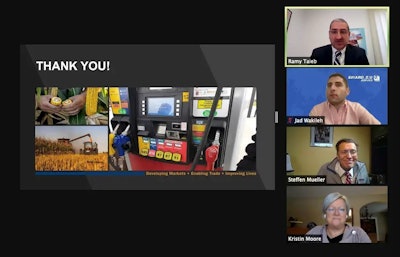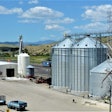
The U.S. Grains Council (USGC) conducted a virtual ethanol workshop last month to show stakeholders from Egypt, Algeria, Tunisia and Morocco ethanol-blended fuel’s substantial benefits in emissions reduction, environmental impacts and improving health outcomes.
Speakers focused on blending, handling and transportation and included Dr. Steffen Mueller, principal economist at the University of Illinois, Chicago, who is a leading authority on motor fuel quality, and Kristy Moore, who covered technical issues including how to best address water contamination and phase separation, vehicle compatibility and standardization.
“E10 is a starting point for new policies in North Africa,” says Ramy Taieb, USGC regional director for the Middle East and Africa. “This workshop is part of USGC’s Technical Workshop Webinar Series to sustain and engage efforts to support increased global use of ethanol.”
USGC is targeting the North African markets to expand the number of countries that use ethanol in the region. Exports are currently going to four or five key markets, but not to North Africa. USGC is hoping to plant the seeds for future growth in exports to North Africa by engaging with government and industry decision makers.
The Middle East, Africa and Europe accounted for 14 percent of U.S. ethanol exports in the 2019/2020 marketing year, totaling around 194 million gallons (68.8 million in corn bushel equivalent). Imported ethanol was used for both fuel and industrial purposes.
Top markets in the region for U.S. ethanol included 68.6 million gallons to the Netherlands, 35.1 million gallons to Nigeria, 28 million gallons to the United Kingdom and 24.7 million gallons to the Arabian Peninsula, primarily the United Arab Emirates, Oman and the Kingdom of Saudi Arabia.
As countries in the region work to reduce their greenhouse gas (GHG) emissions under the Paris Agreement, USGC’s regional office in Tunis is operating programs to develop or expand ethanol use in more than 20 countries and Europe. Ethanol provides a pathway to meet these commitments by reducing the carbon intensity of transportation fuels. According to the U.S. Department of Agriculture (USDA), corn ethanol will reduce GHG emissions by 50 percent by 2022 compared to conventional gasoline.
Following this successful workshop, USGC plans to continue organizing regional workshops on the environmental and air quality benefits of ethanol on a quarterly basis.
Learn more about the USGC's work to promote the use of ethanol globally.





















